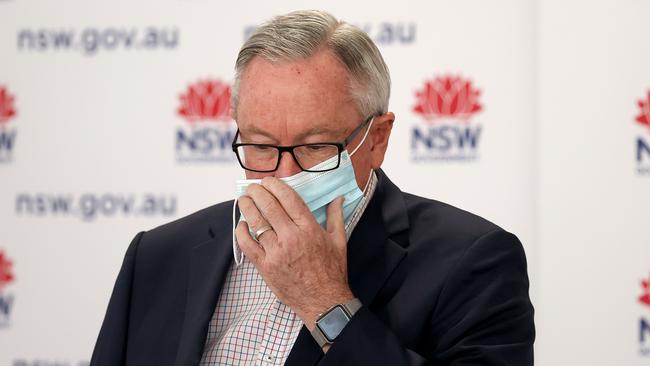Covid-19: ‘All options on table’ for jab passport
NSW has called for a national approach to protect businesses that try to force employees and customers to be vaccinated against Covid-19.

NSW has called for a national approach to protect businesses that try to force employees and customers to be vaccinated against Covid-19.
Health Minister Brad Hazzard said on Sunday that while it was possible he could use state public health orders to override privacy legislation and allow disclosure of a person’s vaccination status, the federal government should take the lead at this stage.
The reach of the federal Privacy Act is central to whether a “vaccination passport” can be enforced by retailers and other companies and whether employers can require staff to reveal if they have had a jab.
Along with the Fair Work Act, the privacy legislation is problematic for companies trying to decide if they can compel people to be vaccinated.
The federal government says business must make the running on the issue but companies are desperate for more support.
While some sectors are considering following food processor SPC and making vaccination a condition of employment, other companies could consider asking staff if they have been vaccinated.
The problem is that under the Privacy Act, no one has to disclose vaccination status.
Privacy expert Peter Leonard believes specific public health orders will be needed in the same way NSW had to use a public health order to mandate the compulsory QR check-in.
Mr Hazzard said he was looking at all options. “Obviously the intent is to try and get everyone vaccinated,” he said. “Common sense says it is the way out of the pandemic but I know in some quarters, common sense is in short supply.
“For that reason, as you would expect, I am looking at all options, including the legal options and getting appropriate legal advice. I stress at this point, no decision has been taken in NSW on whether we will proceed down an ‘across the board’ mandatory path.
“If we did, it may be possible to go it alone on a state-only basis through the Public Health Orders, but again, at this point that course of action is not certain.
“The logical and sensible and also preferred position is that a national approach is taken, as there has to be 70-80 per cent of people across the nation vaccinated.
“So at this point, I would like to see the commonwealth lead on this issue and bring all the states and territories together in a uniform position, which is core business for the commonwealth.”
Professor Leonard, principal at Data Synergies and professor of practice at the University of NSW Business School, says orders to override the Privacy Act are “inevitable”.
“The only real question is, do we see it coming progressively on the basis of particular types of employment, or do we see it implemented on a more blanket level?” he said.
While it is unlikely white-collar employers will be able to sack unvaccinated workers under the Fair Work test that it must be “reasonable” – given that these workers can work remotely – bosses could face a dilemma if a vaccinated worker asks if colleagues have had the jab. Under privacy laws, an employer could face challenges if they shared that information.
“While a health minister can assist the employer by enabling them to ask the question, the tricky bit is what decisions (an employer) then makes in response to the answer to that question,” Professor Leonard said.
“This is where privacy law, social benefit and the effects on others come crashing together and lead to some interesting conflicts.”




To join the conversation, please log in. Don't have an account? Register
Join the conversation, you are commenting as Logout